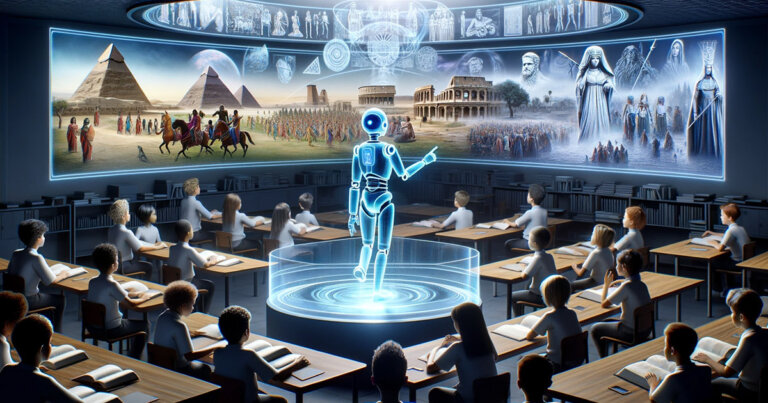 OpenAI strategizes ChatGPT entry into classrooms supporting academic research on AI-assisted learning
OpenAI strategizes ChatGPT entry into classrooms supporting academic research on AI-assisted learning OpenAI strategizes ChatGPT entry into classrooms supporting academic research on AI-assisted learning
Dedicated team may increase focus on educational applications of ChatGPT, targeting enhancements in learning and child development.

Cover art/illustration via CryptoSlate. Image includes combined content which may include AI-generated content.
OpenAI, previously embroiled in controversy over its ChatGPT chatbot’s potential for facilitating academic cheating, is now taking strides toward integrating the technology into classroom settings, according to Reuters. The development reflects a significant paradigm shift in the perception and application of generative AI in education.
Brad Lightcap, the Chief Operating Officer of OpenAI, reportedly revealed at the INSEAD Americas Conference in San Francisco the company’s plans to establish a team focused on educational uses of ChatGPT. Lightcap said,
“We at OpenAI are trying to help them think through the problem and we probably next year will establish a team with the sole intent of doing that.”
Initially, ChatGPT had sparked widespread concern among educators for its potential misuse in homework and assignments. Reuters reported that Lightcap said, “Teachers thought it was the worst thing that had ever happened. “These concerns led to reactionary measures such as school bans and prompted regulatory bodies, including the European Union and the U.S. government, to revise and initiate AI regulations.
However, Lightcap’s comments focus on a need to change the tide in educators’ attitudes toward AI-assisted tutoring. From being viewed as a potential threat to academic integrity, ChatGPT is now being considered for its positive educational applications. This aligns with OpenAI’s ongoing efforts to harmonize AI technology with educational needs, evidenced by its partnerships with Khan Academy for an AI-powered tutoring system and with Schmidt Futures for educational grants.
Academic research into AI-assisted learning.
This strategic pivot comes as AI tools show increasing promise in enhancing learning and development among young children. A comprehensive scoping review of 17 studies conducted across various countries from 1995 to 2021 indicates that AI has effectively improved teaching and learning in early childhood education (ECE).
The review found that AI significantly improved children’s understanding of AI concepts, machine learning, computer science, and robotics and fostered skills like creativity, emotional control, and computational thinking.
In a breakdown of some of the most exciting findings, Williams Park and Breazeal (2019) designed the PopBot curriculum, integrating knowledge-based systems, supervised machine learning, and generative music AI, demonstrating its effectiveness in enhancing children’s learning and comprehension of AI concepts. The study with 80 Pre-K and Kindergarten children showed that AI integration could effectively make robots learning companions.
Kewalramani et al. (2021) further highlighted the role of interactive AI in stimulating children’s higher mental functions, thereby promoting creative, emotional, and collaborative inquiries in ECE settings. This study underscores how AI interactions can enrich the educational experience for young learners.
Furthermore, research has shown that AI-related educational activities can engage children in obtaining authentic knowledge about AI. The combination of emotionally imaginative teaching methods and intelligent tutoring systems enhanced English reading skills, illustrating the versatile applications of AI in education.
Research conducted by Druga et al. (2019) involving 102 children from diverse socioeconomic backgrounds across four countries revealed a better understanding of AI concepts among children in higher SES schools and childcare centers. This finding indicates the influence of socioeconomic factors on children’s perception and understanding of AI.
Moreover, a study by Williams Park and Breazeal (2019) demonstrated that early AI education could effectively teach children to understand AI concepts daily, enhancing their interaction with teachers and peers.
Integrating ChatGPT into educational settings aligns with these findings, offering a glimpse into the future of AI in ECE. While challenges such as privacy concerns and the need for robust age verification systems remain, the potential benefits of AI in enhancing learning experiences and fostering essential skills in young children are increasingly evident. OpenAI’s venture into education with ChatGPT marks a significant step in harnessing AI’s capabilities to enrich and transform early childhood education.





















































